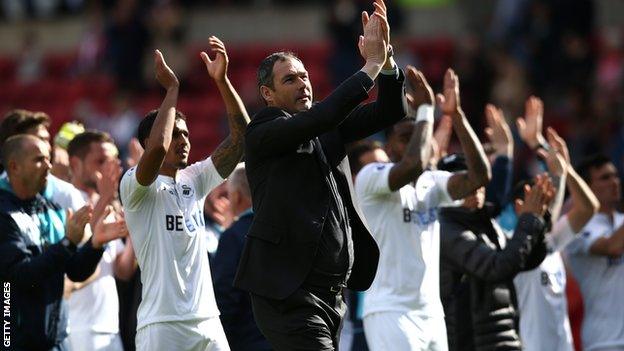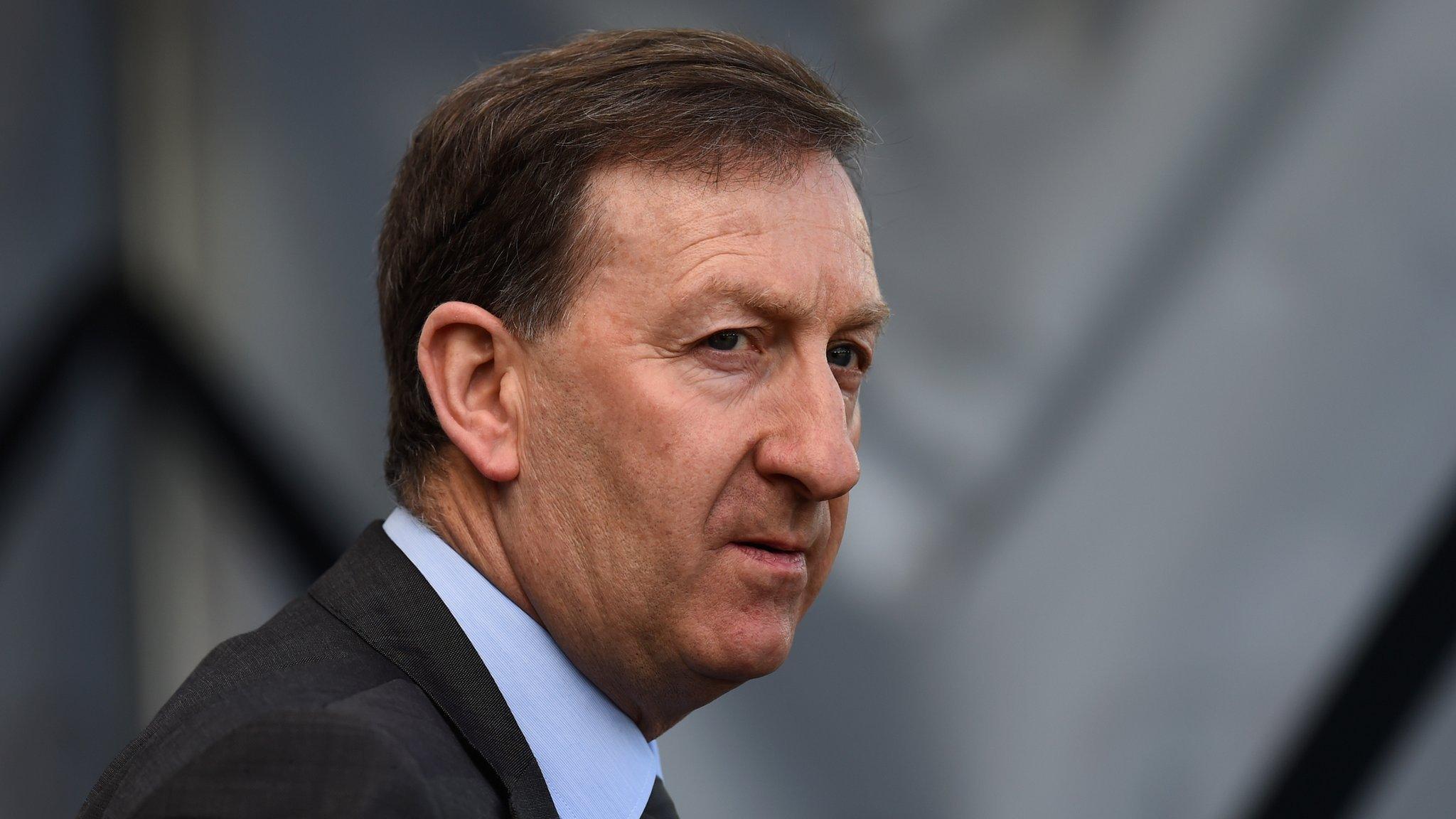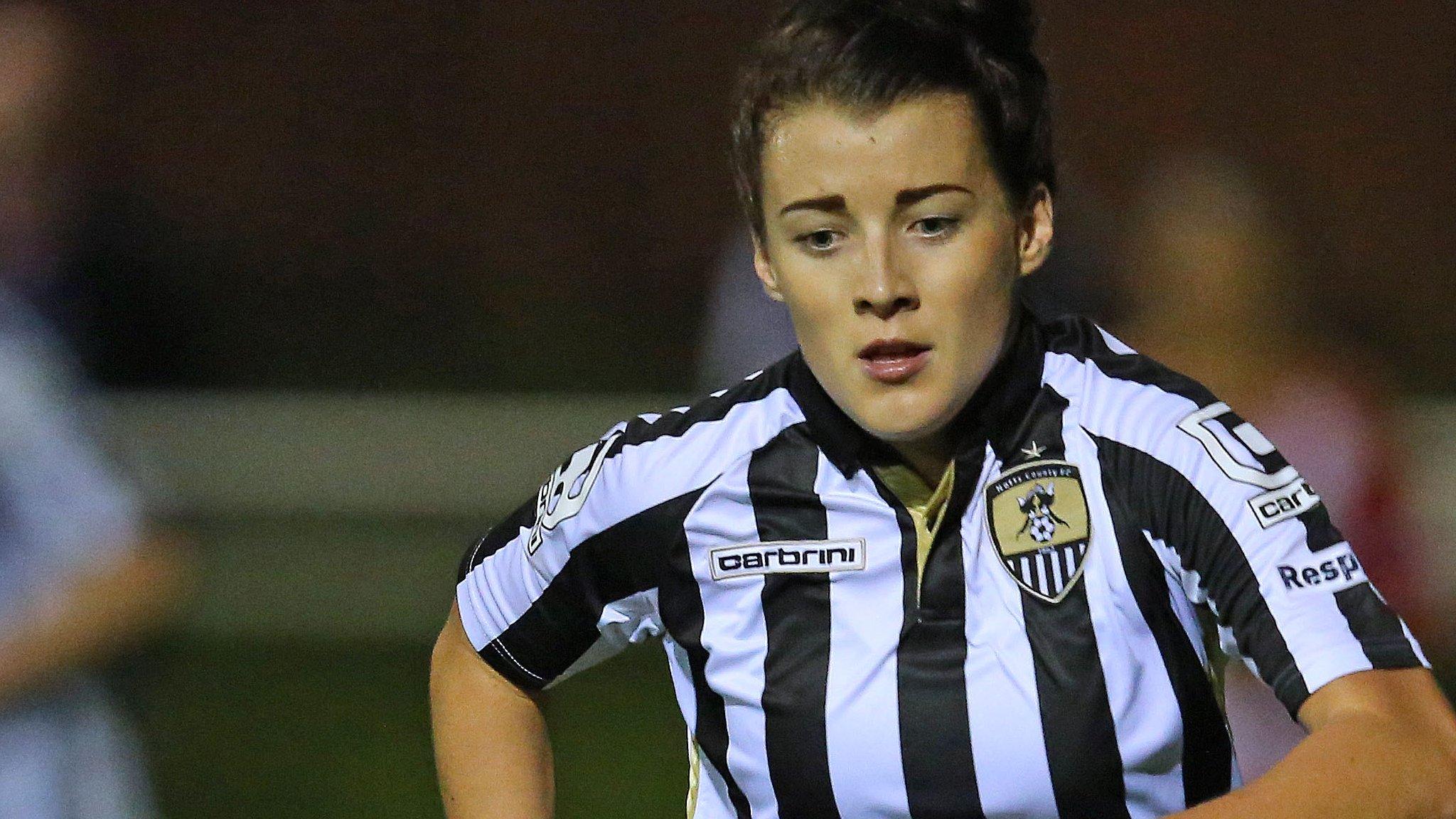Swansea City: The challenges start now for American owners
- Published

Paul Clement's side would have finished seventh in the Premier League, had the campaign started the day he took charge
After a first season in which they employed three managers, faced fan protests and escaped relegation by the skin of their teeth after battling the drop all season, Swansea's owners will be under no illusion about the task ahead.
American investors Steve Kaplan and Jason Levien, alongside remaining chairman Huw Jenkins, will have had little time for celebration at a 'Great Escape' engineered by manager Paul Clement, with Swansea defying the odds by being joint-bottom on New Year's Day, only to survive with a game to spare.
Paul Clement's younger brother Neil, a mainstay of the West Brom side who defied the history books in 2005, external with their own Premier League renaissance, no longer holds the family bragging rights when it comes to stunning revivals.
However, for Swansea to avoid a similar season of struggle next term, they will need to address the challenges for a club with one of the smallest budgets in the richest league in the world.
Jenkins has already stated that Swansea will not 'overhaul' their playing squad, and having accrued 26 points from the second half of the campaign under Clement's watch, that view is perhaps prudent, if not the headline fans may have wished for.
But another campaign like this one will not be good enough, something the Swans hierarchy are happy to acknowledge.
Watching Palace v Hull too much for me - Clement
Learning from mistakes and 'lowest point'
Having backed and then sacked Francesco Guidolin and then hired and fired Bob Bradley within 85 days, not to mention spending a record fee of £15m on striker Borja Baston - current ratio, £15m per goal - there can be little doubt Swansea made mistakes across the board this season, something chairman Jenkins agrees with.
"The last year has been very hard for a number of reasons, on and off the field," he told BBC Wales Sport.
"To get over the line and stay in the Premier League gives us a great opportunity to do things in the summer to push on. And Paul Clement having a full year here with us, I think that will also be key.
"Against all the odds he's kept us up and I'm delighted for him because he took a risk in coming here.
"He gives us a chance to re-organise again in the summer.
"Looking back, [there are things] we should have done differently, collectively.
"I think for everybody, with the changes in the shareholding, the changes in players and managers throughout the first half of the season, it didn't look good and it didn't create a good image for our football club.
"It was probably the lowest point and I concede on that.
"Over the last 15-years we've always been proud of what we've done and what we've achieved and we've tried to do things in the right way.
"And perhaps in the first six months of this season, that was a big let down and we lost a little bit of pride and belief in what we were doing.
"But we can't dwell on that and look back too much. We've put it right and we've got a great opportunity to add further and push forward with a strong squad for next season.
"With Paul Clement, I think we've gone back to the old Swansea way of putting the football first."
Swansea City: A Premier League survival story
Investment will be priority
For Swansea's fans rightly proud of their previous fan ownership and community club model, a lack of investment from the new owners would be unforgivable.
But chief operating officer Chris Pearlman says there should be no concern on that front, even though the club intend to remain debt-free.
"The objectives of Jason and Steve are simple: to do everything they can to make the best club possible, to stay in the Premier League and to finish as high as possible," Pearlman told BBC Wales Sport.
"That's the big picture and Premier League status in the number one focus, every move we make this summer will be with that end goal in mind for the club. They will put all available resources behind doing that.
"They've now first-hand got a sense of what the pressure is like when things aren't going well, and how important every decision they make is.
"The implications for not succeeding are massive. We've all learned quickly how intense everything is and we know in the Premier League the pressures are enormous.
"The owners won't recklessly pour debt into the club, which is important for supporters to know, we are debt-free and that is how we intend to continue operating.
"What we need to do is invest into the team but also look for new revenue streams to invest further. All the goals we have in mind are to allow us to invest more in the team."
Jason Levien and Steve Kaplan say expanding the stadium is 'top of our list'
Ground ownership on the agenda
Pearlman reiterated the view that taking ownership of and expanding the Liberty Stadium remains a priority and says the Liberty's capacity of 20,520 is prohibitive.
"The first thing we need to do before we explore expanding, is to look for a way to gain more control of the stadium," he said.
Swansea council built the £27m stadium where Swansea and the Ospreys rugby team have played since 2005.
The Swans and the Ospreys currently pay rent to the Swansea Stadium Management Company (SSMC) - a partnership between the council and two clubs.
"The current agreement is a dated agreement between Swansea, the Ospreys and the city council," Pearlman said.
"Putting an expansion is very expensive and for us to do that, we need to make sure we have 100% control over the stadium.
"The conversations are progressing with both parties. It's not the easiest thing to get done, but ultimately it's in the best interest of all three parties for us to take over the ground.
"Assuming that happens, we will take a much closer look at expanding the stadium.
"We are missing out on a new generation of fans, because they can't come and watch us play."
- Published15 May 2017

- Published16 May 2017
